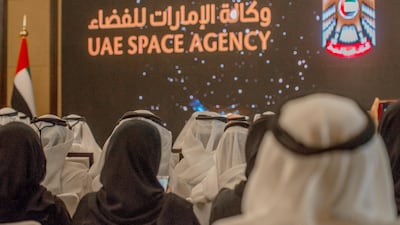The UAE Space Agency may be young but it has come a long way since its inception in 2014.
Since then, it has signed cooperation agreements with around 20 countries, including the US, Russia, China and France, with more planned this week.
The agency is a member of international space organisations and alliances, such as the Committee on the Peaceful Uses of Outer Space, the International Space Exploration Coordination Group, the Group on Earth Observations and the International Astronautical Federation, with whom it is hosting the 71st International Astronautical Congress in Dubai in 2020.
The UAE was also an early and active member in the development and application of regional and international satellite and radio-communication regulatory frameworks, even before the agency was established.
It is currently looking to expand on its more than seven satellites in operation for commercial, defence and government use.
Together with Thuraya, UAE University, Yahsat, Khalifa University and the Mohammed bin Rashid Space Centre (MBRSC), it has invested more than 5.5 billion dollars in the space sector to date.
"We are unique in our region because we are setting the highest and most ambitious goals," said Dr Mohammed Al Ahbabi, the agency's director general. "Our largest investments within the sector are geared towards developing our human capital, space science and research infrastructure."
With its National Space Policy and National Space Programme in place, the agency is on its way to establishing a national space regulatory framework. "KhalifaSat, due to be launched next year, will be 100 per cent developed by Emirati engineers in South Korea," Dr Al Ahbabi said. "All further development, manufacture and testing will be moved to MBRSC headquarters. Our educational and human capacity development initiatives are feeding directly into the Mars Hope Probe 2021 mission and Mars 2117 project and we are developing all of the elements we need for success: ambitious programmes, human capacity, infrastructure and the right framework in which to operate."

The UAE Space Agency's achievements since inception
More agreements expected to be signed this week
Most popular today
